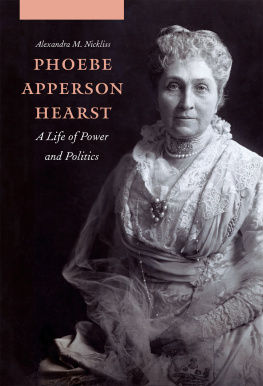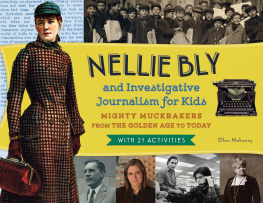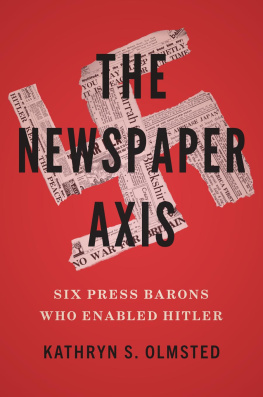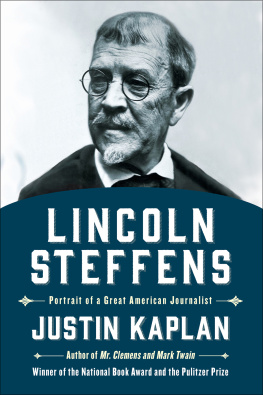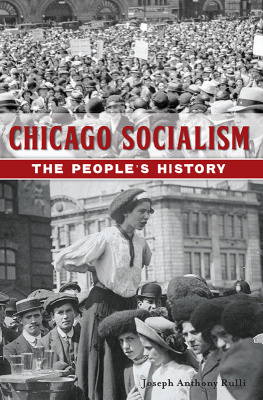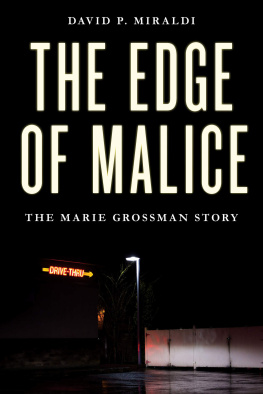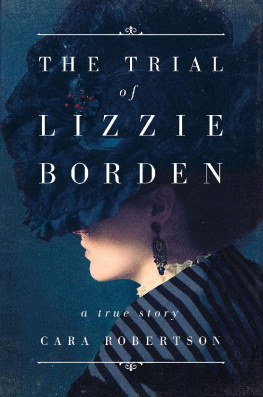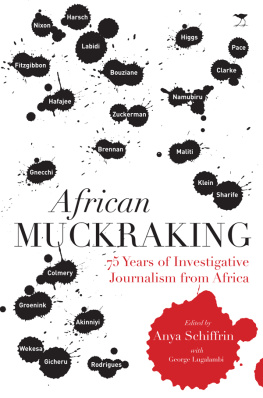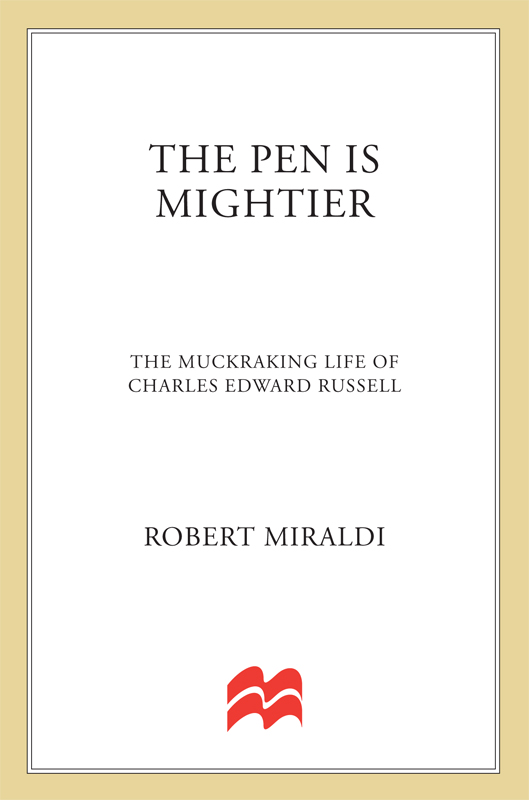Contents
Guide

The author and publisher have provided this e-book to you for your personal use only. You may not make this e-book publicly available in any way. Copyright infringement is against the law. If you believe the copy of this e-book you are reading infringes on the authors copyright, please notify the publisher at: us.macmillanusa.com/piracy.
Contents
To Charles Pfeiffer, a good man
I N THE VOLUMINOUS CLIPPINGS, LETTERS, AND DIARIES OF Charles Edward Russell (18601941) in the Library of Congress in Washington, D.C. is a reference to Howard University, a small coeducational college founded in 1867 to educate newly emancipated slaves. The university had once given a testimonial dinner for Russell late in his life, honoring him for the many causes he championed and crusades he mounted in a fifty-year career in journalism, politics, diplomacy, and letters. While Russell was most famous during his life for his work as a muckraking or expos journalist in the first two decades of the twentieth century, he was also well known in the African American community for his support of equal rights for blacks. In fact, in 1909 he was one of the three founding members of the National Association for the Advancement of Colored People. When he died in 1940, a black community newspaper in Washington said: Mr. Russell was one of the best loved figures in this section and proved himself a genuine friend of the Negro race.
When I called Howard University to find files related to Russell, I was transferred to the MoorlandSpringarn Collections, where historical materials on African American literature and history are housed. A librarian told me that there were indeed materials on Russell. Not knowing that I was many years into my research, she began to tell me who Russell was. Lets see, she said. He was a poet and publicist. And, from what I see here, he was a great friend of the black people. He was a white man, you know.
Charles Edward Russell was a lifelong journalist bent on raising the public consciousness; a muckraking provocateur exposing the excesses of industrialism; a crusading progressive reformer seeking to make things better; a brooding poet; a biographer with a penchant for finding righteous lives to unfurl; a fighter for civil rights; a left-wing orator and politician who believed that cooperation needed to replace competition in America; and a diplomat and patriot who wanted to help America fight the forces of authoritarianism in the world. Russell was all of those things in a remarkably diverse, productive career that spanned sixty years. Unfortunately, his has tended to fall into the shadows of history, partly because of the difficulty of pinning down and defining the man who was Charles Edward Russell.
Born in the Midwest in 1860, Russell moved to New York City as a young man and became one of Americas most famous newspaper reporters. Next he edited the two largest newspapers in America under Joseph Pulitzer and William Randolph Hearst during the yellow journalism phase of American newspapers. After the turn of the twentieth century, he joined with a group of other journalists who became famous as the muckrakers, attacking political corruption and industrial excess and urging reform. Unlike his colleagues, however, Russell turned for solutions, like millions of other Americans, to socialism. He ran four times for political office as a Socialist, twice nearly receiving the partys presidential nomination. Despite his anti-capitalist sentiments, Russell became a fierce patriot who argued for American entry into World War I. His pro-war stance prompted the Socialists to throw him out of the party, but it led President Woodrow Wilson to enlist him as a diplomat to fight the threat of German authoritarianism. When the war ended, Russell turned to various new causes and to writing biographies, for which he won a Pulitzer Prize in 1927.
To trace Russells life is to brush up against all of the great reform causes of the late nineteenth and early twentieth centuriesPopulism, Progressivism, racial integration, and Socialism. In the process it becomes clear that many of the issues that engaged Russell are prevalent today. As this book was being finished, a scandal emerged concerning a Texas energy giant, the Enron Corporation. Reports of inflated stock prices, corporate profiteering, and political-influence peddling made national headlines, prompting criminal and congressional investigations. Beginning in 1904 and for twenty years thereafter, Russell routinely exposed these same problems, arguing that American companies were regularly inflating their profits in order to sell stock at higher prices and arguing that both political parties could be bought by the big corporations. Reform and regulation, he argued, would never cure the problem, because wily company heads, spurred by the natural desire for maximum profit, would always find a way around government regulators. Moreover, he argued, finding loopholes in regulations is the natural thing to do in a competitive system that forces even good people to behave in a way that enhances the bottom line at the expense of other prioritiesand the law. Until the day he died, Russell felt that capitalism was at the root of many of Americas ills, and his major journalistic effortsexposing the slum landlord Trinity Church, the tyranny of Americas meatpacking monopoly, the cruelty of a prison labor-capitalism cabal, and the octopus-like powers of various industrial combineswere directed to show how unregulated capitalism would breed evil. If Russell were alive today he would be writing many of his same stories, especially the ones that pointed to a growing gap between the wealthy and the poor, the issue that most turned him to Socialism as a cure.
As he crusaded against a variety of evils and muckraked Americas problems, Charles Edward Russell became one of the most well-known writers and journalists in America. It was impossible not to encounter Russell in a headline or byline in the first twenty years of the twentieth century. But Russells work and impact have been largely forgotten today. In addition, Russells turn to Socialism in 1908 and his foray into elective office isolated him from the more conventional and popular reformers of his day, as well as muddied the waters between his roles as journalist and activist. Have historians resented Russell for leaving the conventional political fold and embracing radicalism? If so, they would be unfair. Russells politics were always democratic. Frankly, much of what he wantedfrom old-age insurance to government control of the railroads to stricter rules for the workplaceis accepted as social policy today, and hardly radical. Russell the person may have also diminished his standing in history. Formal, private, and almost austere, he has failed to capture the imagination of biographers. Indeed, finding the personal side of Russell has been near impossible for this writer. When they can be found, his letters are almost always on social issues and deal little with passion, love, or family. The diaries he kept during World War I discuss the war, and never his emotions.
As a public figure, however, Russell was not difficult to locate. He was everywhere in the early twentieth centuryin newspapers, magazines, and books and on the lecture circuit. One summer I was in a New York University library looking at microfilmed material on socialism. A young man at an adjacent microfilm reader struggled with his machine. I helped him adjust his focus, and almost magically a large black-and-white photograph appeared of Charles Edward Russell, who was surrounded by Yiddish headlines. The man was reading Abraham Cahans Forward, a daily newspaper whose crusades for social justice profoundly influenced the Jewish community. A story about Russells 1912 race for New York governorand his progressive platformwas the lead item in that days Forward. It was ironic, of course, that Russell popped up in the center of page one of the Forward on an adjacent screen just as I was researching his life. But it was also fitting: he was a pervasive figure who deserves to be front and center in any discussion of twentieth-century social justice, investigative journalism, and progressive publicity.


